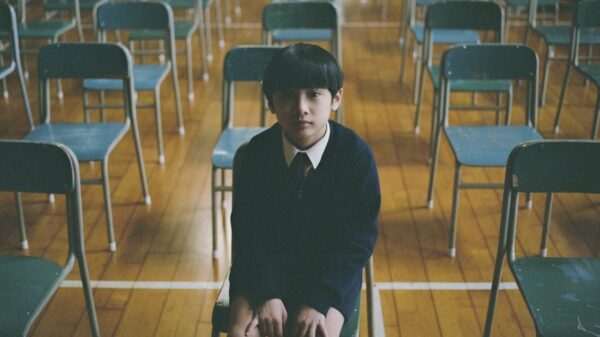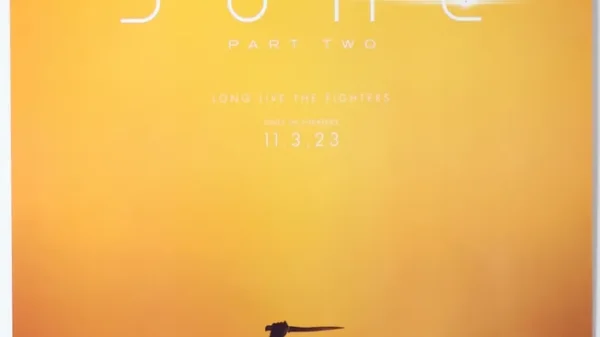Staff Writer Charlie Dennis Reviews ‘The Zone of Interest’ addressing how director Jonathon Glazer deals with the theme of banal evil in Nazi Germany.
After finishing The Zone of Interest, a friend and I had very little to say. We sat through the credits hoping for something more, and when nothing came, we got up and left. My friend turned to me and asked, “But what was the…point?” which, on reflection, might encapsulate the fundamental purpose of this A24 film. Jonathon Glazer’s depiction of a Nazi family’s seemingly ‘normal’ life living on the edge of Auschwitz concentration camp is a disarming portrayal of the banality of evil that pervaded the institution of German family life. Following this purported story of a family among others, you are left with engulfing misery and nothing else to grasp onto.
The title of the film employs the Nazi term for the 40 square kilometre perimeter of the camp: the boundaries which this film explores in an undeniably perverse manner. The film begins and continuously depicts the rural idyllic paradise this family seemingly occupies – bathing on peaceful riverbanks and simple summer days in their country home. The pride that Hedwig Höss feels for her expansive landscaped garden, even furnished with a swimming pool, epitomises the somewhat familiarity of an average middle-class family. It depicts life for this family as something somewhat romanticized and desirable, something which is unnerving with the knowledge of its theme.
As you follow the benign story of this family, you begin to understand the unheard and unsaid horrors hidden behind the concrete walls which enclose their home. While observing the surface-level beauty of this family life, you start to hear what Glazer names ‘the other film’: the abominate sounds of furnaces and the cries of the countless victims beyond the garden. The veil of the family’s beautiful life is continuously ruptured by the sounds of torment. The viewer must watch as this family continues joyously and triumphantly completely apathetic to the extermination of millions under the command of the family patriarch Rudolf Höss. The duality of visual and auditory experience is the striking accomplishment of the film: two worlds are created, but their fusion in this medium illustrates the depraved banality of evil.
Hannah Arendt, the Jewish philosopher and historian, coined the term ‘Banality of Evil’ as an explanation of the normalised indifference which permeated Nazi society. The Zone of Interest displays how this infection permeated and allowed the Nazi regime to carry out the atrocity of the Holocaust. This is captured through their ignorance of the screams and flames outside their windows, but additionally through Hedwig’s comfort in wearing the stolen clothes of murdered prisoners. The effectiveness of Glazer’s film in demonstrating Arendt’s reflections is a testament to its power – but leaving the screening I was unsettled by the positionality of the Jewish victims.
This film pays very little attention to the real victims of the Holocaust –the director explains how this film was devoted to understanding the ‘perpetrator perspective’. Although Glazer’s mission with this rendition was executed meticulously, I continue to question whether commendable Holocaust depictions should operate in this field. The exploration of the experience, memory, and resistance of Jewish victims is limited to an eery scene of an unnamed Jewish girl leaving apples for the starving prisoners. Additionally, it feels obscured by the night vision special effects employed to produce tension for the audience – which veer on turning this very limited Jewish representation into a gimmick.
In trying to examine our confusion after viewing this film, my mind cannot drift from the unadulterated misery of the conclusion of the narrative. The last act of this film depicts, in an unembellished style, the progression of genocide as the regime decides to transport Hungarian Jews to Auschwitz. The film ends with Höss transcending down the stairs before he stops, heaves, and fails to vomit before staring at the camera positioned in a darkened hallway. The film cuts to footage of janitors cleaning the Auschwitz-Birkenau State Museum. The audience is immediately confronted with the real consequences of the climax of this ‘fictional’ narrative – the undeniable atrocity of the Holocaust.
This film does not seek to create nor resolve any of the stories of the Höss family: their stories are completely obsolete in the face of the other side of their garden wall. Instead, we are confronted with the tangible horror of the Holocaust and the institution which remains in its memory. The film leaves you with nothing except a feeling of hopelessness and depravity. Perhaps my discontent with the absence of Jewish stories rather arises from the fact that there is no story of hope or resistance to cling to: we are not presented with characters to remember and love.
If I was still in the cinema when I was posed the question “What was the point?’ I would reply “Why do you want one?”. This film doesn’t offer a radically new depiction of the Holocaust which you can intellectualise to distract yourself, or any comforts to which you can fixate on. There is nothing to contemplate regarding the story of this German family or the supposed Jewish stories behind the wall. Glazer does not provide an escape to feel anything but utter despair.
He has attempted to create something honest, albeit indie, in an arresting portrayal of the banal evil which permeated German society. There is no appeal to sentimentality or moral dichotomies, it makes you sit with the atrocity of genocide and nothing else. As global antisemitism appears to be rearing its bestial head once again, The Zone of Interest offers a reminder of its barbarity and ability to infect the fabric of a nation.

















